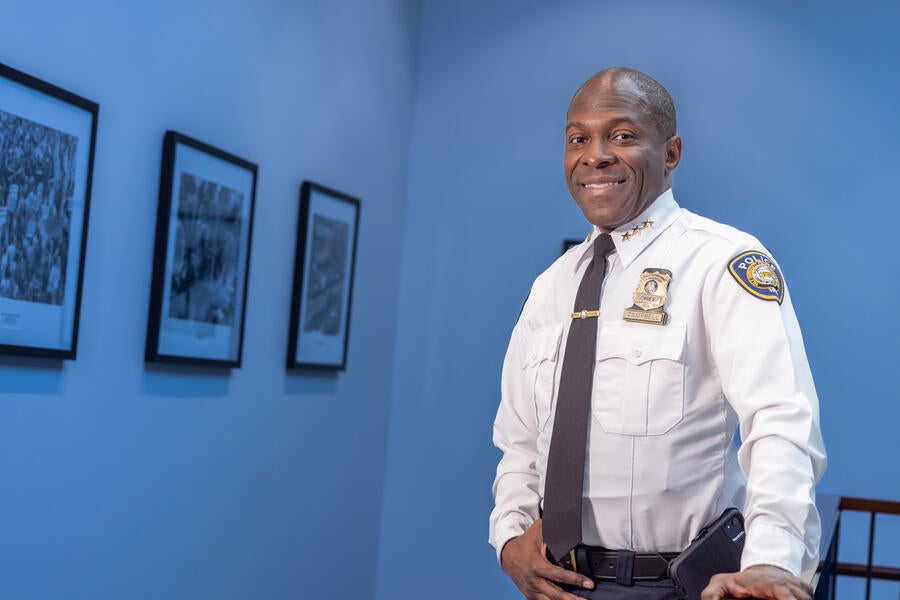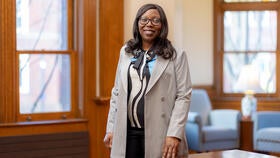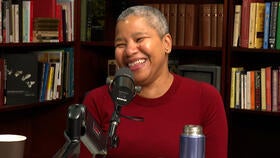
From an early age, Yale Police Chief Anthony Campbell ’95 B.A.,’09 M.Div understood the wounds incarceration inflicts on inmates, their families, and those who work with them: his mother served as a corrections officer at Rikers Island, and his father had spent time in prison. As Anthony grew older, he felt an urge to help heal those wounds. He assumed that meant working within the prison system — until his mother gave him a new perspective. “Touch their lives before they get into prison,” she told him. Anthony had the counterintuitive realization that, as a police officer, he could help people avoid incarceration altogether.
Policing is not just about law enforcement. It’s also about connecting positively with individuals to stabilize the negative situation they find themselves in and help them move forward.
Policing is not just about law enforcement,” he says. “It’s also about connecting positively with individuals to stabilize the negative situation they find themselves in and help them move forward.
Anthony brings this empathetic perspective to his work as chief of the Yale Police Department, a role he assumed on August 5, 2022. In carrying out the university’s public safety strategy, Anthony works to minimize the involvement of uniformed officers in situations where people are struggling with mental health crises or inebriation, to coordinate relevant student life and health resources, and to increase outreach to the Yale and New Haven communities. It’s a continuation of a belief he’s carried throughout his long career in law enforcement — that the most effective policing is deeply humane.
A focus on outreach and understanding
Raised in New York City, Anthony witnessed the devastation the crack epidemic of the 1980s wrought on his Harlem community. Determined to take a different path, he focused on education as a steadying force. He attended Fordham Preparatory School, an all-boys Catholic Jesuit high school, and graduated as his class’s valedictorian. At Yale, he majored in religious studies — intending, until his mother’s insight, to work in prison ministry. Instead, a few months after graduation, he enrolled in the New Haven’s Police Academy, which takes a community-based approach to training.
“They had us doing community service in soup kitchens and homeless shelters, going to prisons and speaking with the inmates to find out how they got there and what they wanted to do when they got out,” says Anthony. “It was about helping new police officers acknowledge people’s humanity.”
He joined the New Haven Police Department (NHPD) in 1998 as a beat patrolman. Over 18 years, he rose steadily, eventually serving as Police Academy director and assistant chief, and, ultimately, as chief of police. During his tenure as chief, New Haven experienced record-setting levels of crime reduction — a result he attributes to strong community policing and solid ties with local leaders and clergy. “We had such a great relationship with the New Haven community that, when something did go wrong, we moved forward together and not as adversaries,” he says.
Anthony’s human-centered approach also influenced his relationship with his officers and his recognition of the difficulties they might face. “It is an honor to serve, but it’s labor intensive and has consequences,” he says, like extreme stress and burnout. To support his officers’ wellbeing, Anthony bolstered their training, recognition, and support, including wellness checks.
His leadership was enriched by a return, earlier in his career, to school — this time, to train in the ministry. While serving with the NHPD, he enrolled at Yale as a graduate student at the Yale Divinity School (YDS), spurred by a desire to find new ways to understand and connect with his community — “how to be compassionate and how to touch people where they are,” he says.
At YDS, Anthony deepened his academic and spiritual approach to death and dying, which became an integral part of his police work. As NHPD’s chief, he made a point to meet with homicide victims’ families and attend their funerals. “Police also need to be part of the healing process,” says Anthony, now an ordained minister and adjunct faculty member at YDS.
Reimagining protect and serve
In early 2019, Anthony retired from the NHPD; a few months later, he joined the Yale Police Department as assistant chief. “Yale is home for me,” he says, noting that he’d always had a “great desire to return to the university to work in policing, long term.”
That same year, the YPD, the oldest college police force in the country, began to reassess policing on campus, and commissioned a third-party evaluation of itself that sought input from university faculty, students, staff, and members of the New Haven community. As national events prompted a larger reckoning with race and policing, one that continues today, that commitment to self-reflection only intensified. In 2020, the YPD adopted a differential response model called “Fit for Purpose,” which uses non-uniformed, unarmed responders to resolve situations whenever possible (for instance, when responding to noise complaints or reports of an intoxicated person).
Anthony has proven essential to the YPD’s commitment to progressive policing. “Chief Campbell is an exceptional leader,” says his predecessor, former Chief Ronnell Higgins, now Yale’s inaugural associate vice president for public safety and community engagement. “The experience he brings to the Yale Police Department is invaluable, and his ability to build and maintain trust and mutual respect are crucial to Yale’s collaborative approach to public safety.”
Among his priorities for the YPD, Anthony plans to expand officers’ access to professional training and development. He envisions building a team of leaders who improve lives, as well as fashioning a unique role for campus police in service to both the university and to its home city.
“Parents drop their children off into our care. We watch over them. Staff and faculty come here to work, teach, and do research. We are here to provide a stable and welcoming environment for our community,” he says. “Nothing can be accomplished, learned, or researched if people don’t feel safe.”
LiveSafe: Security in your pocket
Turn your smartphone into a mini safety device by downloading the LiveSafe app, which offers students, staff, and faculty on campus an effective way to communicate with Yale Police directly or anonymously. Call for help, text in tips, request a walking escort, and track the Yale Shuttle.






